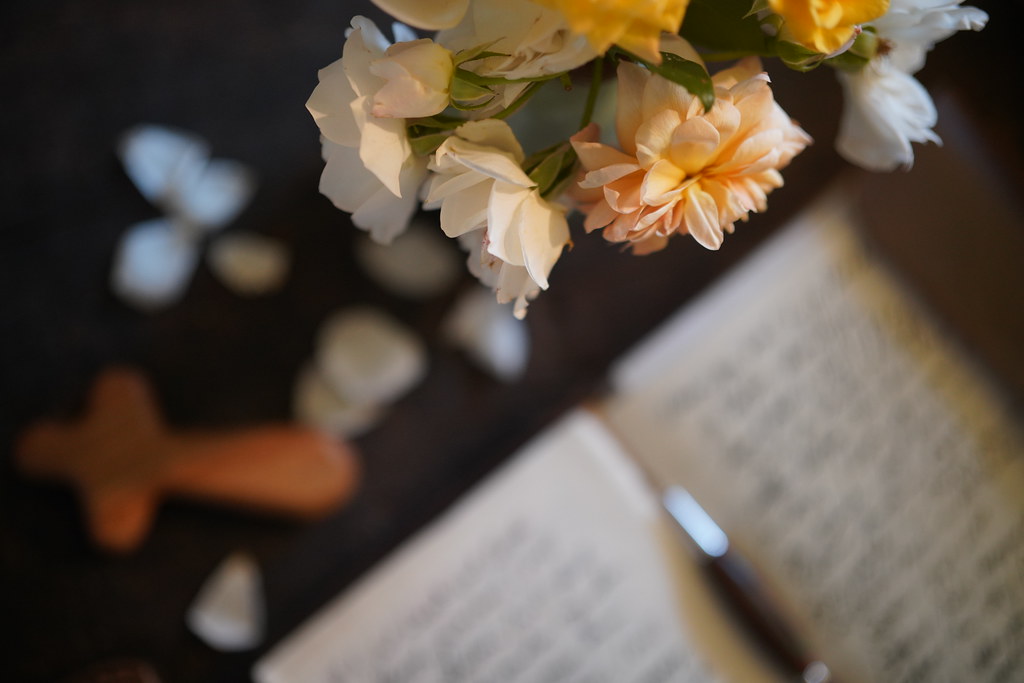In the days after Ash Wednesday & reflecting on how we are all dust, & to dust we shall return, I keep walking gingerly across our farm house’s century-old planks floors, with the finish wearing down after decades of raising more than half a dozen kids here, and I keep feeling my stitches & my own mortality & all this passage of time.
The soul needs a practice of reflection so it can see the Way forward.
Maybe an honest journey through Lent is always a pilgrimage of reflection – reflecting on where you’ve been, and all the wildernesses you have weathered, while reflecting on where you’re going and where the Way Himself is taking you, as you keep practicing the cruciform way of the Way Himself.
The only way to see the way forward, is to have a spiritual practice of reflecting back.



Without the practice of spiritual reflection, there isn’t any self-awareness.
Too often we can’t learn from the moments of our day; rather we can learn if we have a practice of reflecting on our day, for several moments every day.
Without reflection, you can end up doing things you’ve always done, while expecting things to be different. Too often we don’t learn from the moments of our day; rather we only learn if we have a practice of reflecting on our day for several moments every day.
Without reflection, the soul lacks education.
Spiritual reflection is required for spiritual maturation.
I wrote it in the front of my journal this year: Your souls needs a practice of reflection if you want to see the Way forward.
It’s true: It takes courage to take time for reflection, because loud actions look more effective than quiet reflection, when the reality is what Peter Ducker says, “Follow effective action with quiet reflection. From the quiet reflection, will come even more effective action.”
Spiritual reflection is required for spiritual maturation.
One of the most profound questions of spiritual reflection that reverberates and resonates for each of us on our own spiritual pilgrimages is the very question God Himself asks Hagar out in her own wilderness: “Where are you coming from and where are you going to?”
What my work toward my Masters at Wheaton, all the vulnerable studying at The Healing Trauma Institute, the year of course work at The Allender Center in Narrative Trauma Care, and my current studying toward a doctorate at Biola University in spiritual formation and soul care, have all been part of teaching me:
The practice of reflection is key to practicing soul growth. The practice of reflection is key to practicing being cruciform. The practice of reflection is key to practicing repentance. The practice of reflection is key to practicing thankfulness.
The practice of reflection is key to the practice of faith.



As I have been writing daily in my SACRED Way journal for the last several years, that’s the same question I again write this week across the top of a page in my journal, as I prepare to leave to serve the 10th anniversary of IF:Gathering, as this year marks more than 20 years of personally blogging here and journaling my spiritual journey.
“Where am I coming from? Where have we been? What roads and wildernesses have we come through?”
Without reflection, the soul lacks education.
This practice of spiritual reflection can give you eyes to see how you’ve come through the most unexpected wildernesses:
-> Your little kids have grown up and into adults, and into stories of their own, different than yours, with different boundaries that deserve respect and all the grace you’ve ever known.
-> You got real things wrong. You limp hard, heart aching, and end up again on your face at the foot of the Cross. You’re refined, sanctified, changed.
-> You lose people you love traumatically. You lose hope, or plans, or joy. You have to figure out ways to navigate, with extravagant grace and unwavering truth and real faith. You have to stagger through the losses that rip through your family, that gets processed in all kinds of different ways.
Without reflection, you can end up doing things you’ve always done, while expecting things to be different.
-> And what you can do is get yourself into cruciform covenant community, get yourself down on your knees and into a teachable space of learning and growing, and you can do the very tender work of healing and growth, because: If you don’t do the work of processing your trauma, you’ll be a source of trauma that someone else will have to work through.
Running the ink of my pen across across pages of my journal, part of this spiritual pilgrimage of a Lent of reflection, I realize I’m still personally experiencing that truth that I quoted of John Piper’s back in One Thousand Gifts: “I know not how the light is shed, nor understand this lens. I only know that there are eyes, in pencils and in pens.”
This is part of the life-long spiritual pilgrimage: Pen and paper and prose can be a way to process pain.
This has been the work of my life.




Though the plan was to quietly raise a bunch of farm kids, to be a farmer’s wife alongside my Dutch Farmer, right here in the same farming community he and I were both were born and raised in…. though I never planned to write books, never wrote an initial book proposal or sought out any agent but was rather just discovered processing all the parts of my life through writing and blogging in a quiet corner of the internet without any comments at all or any social media, discovered by an agent who reached out, asking about taking my story to the pages of a book …. the Word Himself always writes the story in profoundly unexpected ways, yet still always calls us all to the same thing: to lay down our lives on an altar of vulnerability and humility and cruciformity and live a life of givenness.
Wherever you’ve come from, you get to come pick up a cross and live given, extending like the arms of a cross, out into the world.
The call isn’t ever to what’s easy, but to keep easing into a deeper trust of God.
Looking back, yes, whatever came from the first several years from that first book, One Thousand Gifts, was completely given away, partnering with Compassion International to build a school and care center for the children living at the Guatemala City Dump — because those were the words I’d written on the pages of One Thousand Gifts, and keep sincerely praying every day for a way to live: “Christian hands never clasp, and He doesn’t give gifts for gain, because a gift can never stop being a gift—it is always meant to be given.”
Looking back, what was entirely unexpected was how, in the midst of family farming, and trying, in all our broken humanity, to do what should be done with every platform, make it into an altar to be formed cruciform, to live given – God miraculously led to hands-on restore an old church here in town, to be part of a restoration story, not just of an old building, but of all of our tender stories, a place of givenness, a place called The Village Table.
This was not easy, but looking back, you can see that the call isn’t ever to what’s easy, but to keep easing into a deeper trust of God.



Believing in restoration and redemption and rebuilding, what if the dare was to dream and get to work:
What if there was a way to cast a vision of church with fewer pews and platforms, to give more people belonging around tables?
That highschool sweetheart I married, that hardworking farm boy who’d never opt to go on a vacation ever because his favorite place in the world is just here taking care of his mama sows, tending crops, keeping dirt under his fingernails as he works this earth – he led us with his hardworking work ethic into that vision of a church restoration… that was part of restoring the tender parts of us.
The spiritual practice of reflection lets you see not only the parts of the story that you’d do anything to change – but how God used some of the hardest parts of the story to change you.
Leading us into cultivating a family culture of grace and mercy, of not living under shame, but of living under the saving grace of Christ, the Farmer led us to restore that old church into a space filled with tables, a space filled with this hopeful vision: to be a place where the whole community could gather around tables, could gather together, across denominations, with different faith-communities, churches sharing the leading of community-wide worship nights – to be a church of churches.
And after a year of late-night renovations The Village Table became a place too, partnering with the leadership of the Salvation Army and the United Way, to be a safe shelter to serve the vulnerably housed in our community with free shower facilities, free laundry and dryer facilities, and a place to sit around tables for free light meals 4 days a week.
Reflecting back, you can see not only the parts of the story that you’d do anything to change – but how God used some of the hardest parts of the story to change you.

No matter what has not gone as was once hoped: Reflecting back shows you how to imagine the possibility of a better future.
No matter if you’re not sure what comes next: Reflection is how you see the next best action.
No matter where you’re coming from or where you’re going to: An honest reflection of the past is the way you see a holy redemption of the future.
As the theologian Kierkegaard urged, “Life can only be understood backwards; but it must be lived forwards.
Look backward to understand, to understand patterns and dynamics and wounds and failures and still, always, the goodness of God ––and then stand with hope as you live forward, forward into cruciformity and possibility and grace and new ways of being and restoration and redemption and the rising of everything on His healing wings.
In the days after Ash Wednesday, here in the dust of a worn farmhouse, here with a reflecting pen in these early days of Lent, I keep think of how phoenixes can rise from the dust of ashes.
How out of all kinds of dust and ashes, bricks can still be built, and hope can still bravely rise, and how there’s always a way to choose to be one of the Nehemiahs, the ones who reflect and restore and rebuild, steadily and faithfully working with the One who resurrects.
A Lent to Reflect:
one of the Most Miraculous Faith Stories our Family Has Known
WATCH: A Way Through to a Life of Meaningfulness
and this story: Maybe One of the Craziest Things We’ve Ever Done and I’m Kinda Terrified
Tune In for What’s Upcoming in this Series during Lent:
A Lent to Reflect: Part 2: Some of What I Wish I Had Done Differently As a Mom & How to Work Toward Restoration
A Lent to Reflect: Part 3: Even in the face of Regrets: How to Practice Hope and Growth
A Lent to Reflect: Part 4: How to Practically Learn the Art of the Spiritual Practice of Reflection to Experience Soul Transformation







